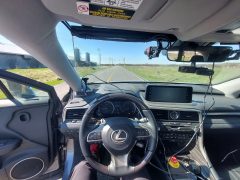2.1: Coordinating data collection, real-time processing, and analysis of the sensor data over time.
Continuously collecting data from both standard and semi-autonomous (SA) vehicle sensors can be challenging. This challenge is what this task will focus on. Additionally, the data should also be processed in a timely and efficient manner. Using sensors to collect data will help to do so.
2.2: Initial design of the Smart AI system needed for interpreting the driving data.
In this task, we will focus on the initial design of an AI system that can gather data from standard and SA in-vehicle sensors to help evaluate driving performance.
2.3: The results of Activity 1 will help examine sensor data requirements necessary to improve the Smart AI risk prediction algorithms (e.g., biosensors in the vehicle cockpit).
This task will focus on the potential addition of other sensors to directly assess the driver. Other sensors could measure vital signs, for example. Such measurements provide additional data that could indicate reduced attention, stress, or other factors.
2.4: Research Ethics Board (REB) approval for in-car and simulator testing with older drivers.
The team will use simulators and in-car testing on the Area X.0 closed track with older drivers. This task will include development of the REB protocol and the approval of the protocol by the Carleton REB.